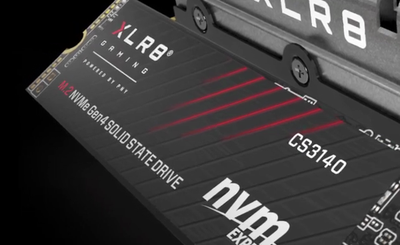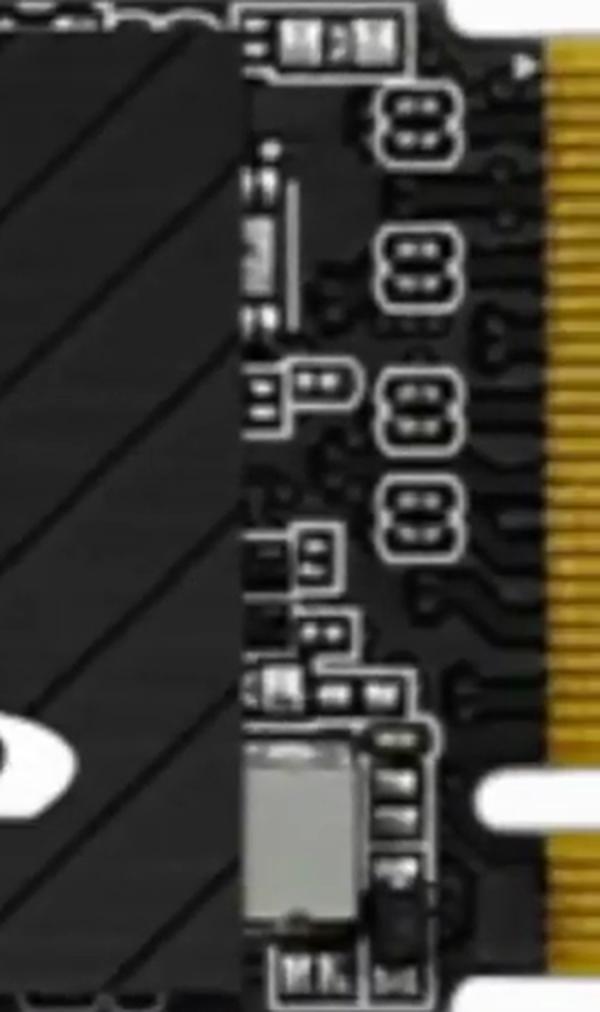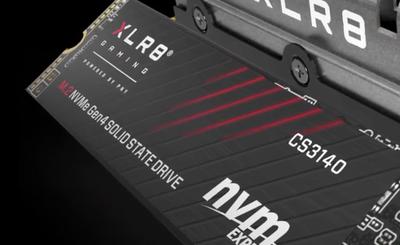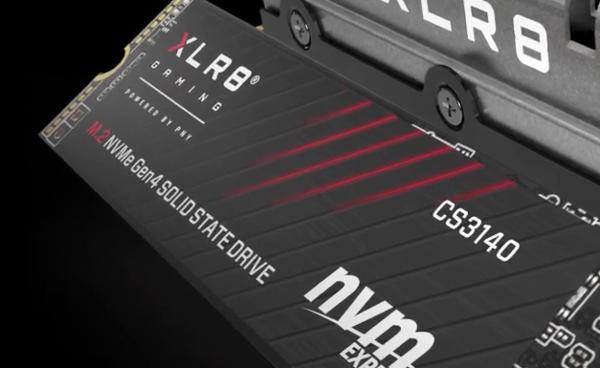
Review: Trying out the PNY XLR8 CS3140 2TB M.2 NVMe Gen4 SSD (2024)
My thoughts on the PNY XLR8 CS3140 SSD: speed, thermal performance, design, and reliability for gaming and work.
Introduction
At work I recently upgraded a computer with the PNY XLR8 CS3140 M.2 NVMe Gen4 SSD. The speed improvement is quite apparent, particularly when starting up and launching applications. I had concerns about the heating issues mentioned that I read about before with this drive, but so far cooling has prevented any problems for me. The five-year warranty is also great. This SSD requires a Gen4 M.2 slot to reach its full capacity. More on my thoughts below.
Some photos (click to enlarge)




Specs of the PNY XLR8 CS3140 2TB NVMe SSD
- Release Year
- Brand
- Color
- Connectivity Technology
- Digital Storage Capacity
- Hard Disk Description
- Hard Disk Interface
- Hard Disk Size
- Installation Type
- Special Feature
- Ssds-compatible-devices
Prices
Introduction to High-Speed Storage

In the world of computer upgrades, the switch from a traditional hard drive to a Solid State Drive (SSD) can feel like stepping out of a propeller plane and into a jet. I've recently been delving into the PNY XLR8 CS3140 M.2 NVMe Gen4 SSD, and it's clear that this component is all about speed. The specs are impressive, boasting up to 7,500MB/s sequential read and 6,850MB/s sequential write speeds. That's a massive upgrade for any system, particularly for tasks that demand a lot from storage devices, like video rendering or high-end gaming.
Here's a quick breakdown of my thoughts:
Pros:
Incredibly fast boot and application launch times
Enhanced bandwidth and low latency compared to SATA SSDs
Durable and backed by a 5-year warranty
Compatible with a range of devices, including PS5
Cons:
Write speeds may not always reach the advertised maximum
Requires a motherboard with Gen4 M.2 slot for full performance
Heat management is crucial for longevity
I notice the difference particularly in areas like system boot-up and game loading times, where the NVMe Gen4 technology means I'm waiting less and doing more. It is a substantial improvement over SATA-based SSDs, which now feel sluggish by comparison. Yet, it's worth noting that while the drive is marketed for its peak performance, some users report that write speeds can be lower than advertised, though in my usage, the impact on my overall workflow has been minimal.
Despite the focus on high speeds, potential buyers should be aware that to achieve these levels of performance, their system must have a compatible Gen4 M.2 slot. Otherwise, the SSD will revert to Gen3 speeds, which, while still quick, won't let the CS3140 flex its full potential.
A personal tip from my experience: If you're using this SSD for intense applications or gaming, heat can become an issue. This is where the optional integrated extruded aluminum heatsink, or a compatible one for PS5 users, comes into play. Proper thermal management can go a long way in maintaining performance and extending the life of the SSD.
Sporting a sleek black design, the CS3140 doesn't just perform well—it looks good in my rig too. I'm considering adding another one to my setup, perhaps for my laptop, as the potential for ultra-fast storage on-the-go is tempting. The fact that it comes in sizes up to 4TB means I won't have to worry about storage space for a long time.
Upgrading to this SSD feels like a no-brainer for anyone chasing top-tier system performance. It's an investment, especially considering the price point for larger capacities, but in my book, the significant gains in speed and overall system responsiveness justify the expense. For anyone on the fence, keep in mind the overall balance of pros and cons, but if you're leaning towards high performance, the CS3140 is a solid contender.
Real-World Performance Insights

My experience with the PNY XLR8 CS3140 SSD has largely been positive.
Exceptional Speed: The pure performance upgrade is undeniable. Transitioning from a standard SATA SSD, the difference in boot times and application load speeds with the CS3140's staggering seq. read and write speeds of up to 7,500MB/s and 6,850MB/s respectively is instantly noticeable.
Heatsink Requirement: If there's a downside, it's that the heat production necessitates adequate cooling, particularly in powerful rigs or for console gamers looking to expand their PS5 storage. The necessity for a separate heatsink purchase for optimal performance is something to consider.
Flexibility: It's exciting to see how versatile this SSD is, being compatible with desktops, laptops and even gaming consoles like the PS5. It's not a one-trick pony and has the potential to revitalize multiple systems.
Warranty and Support: The five-year warranty brings peace of mind, illustrating PNY's confidence in their product and offering a safety net for your investment.
Capacity: Having tested both the 2 TB model in my desktop and the beefy 4 TB unit in my PS5, the storage capacity is liberating, eliminating the need to juggle games and files constantly.
Certainly, there are slight drawbacks. The prominent one would be the expectation management regarding the SSD's speeds. The real-world write speeds can sometimes be a touch below what's advertised, a fact supported by benchmark tests. However, the impact of this on everyday use is negligible, especially when juxtaposed with the overall swift performance.
Another point of contention is the consistency in performance across different units. As user benchmarks suggest, not every SSD will perform equally; there seems to be a 'silicon lottery' at play.
Availability and potential cost during sales versus standard pricing is also a factor worth mentioning. I happened to snag the SSD during an Amazon daily sale, which presented great value, making it a more accessible option compared to its regular retail price.
In conclusion, the CS3140 offers a palpable speed advantage for the technological enthusiast, gamer, or professional, transforming system responsiveness and work efficiency. While there are minor caveats concerning peak performance consistency and additional cooling requirements, these are dwarfed by the substantial benefits this SSD brings to the table. Whether it's for gaming or professional use, the PNY XLR8 CS3140 SSD stands as a solid investment into the future of your system's performance.
Thermal Management and Design

When evaluating SSDs like the PNY XLR8 CS3140, thermal management is not often the first thing that comes to mind, but it’s critical for performance and longevity. The CS3140 touts impressive speeds, which is great, but as everyone knows, with great speed comes great heat generation. So, let’s talk about the two aspects that require attention:
The role of an integrated heatsink
Design considerations for airflow with the SSD
An integrated extruded aluminum heatsink is optional but becomes nearly mandatory for the CS3140, especially for those wanting to push their systems during extended intensive tasks like video rendering or gaming sessions.
Here’s a quick list summarizing the importance of heatsinks and airflow:
Heat dissipation: Heatsinks absorb and disperse the heat away from the SSD’s controller and memory chips.
Maintained performance: Under high temperatures, SSDs can throttle performance to prevent damage. Efficient cooling prevents this.
Increased longevity: Consistent thermal management preserves the SSD lifespan by preventing overheating.
The CS3140's design, with or without the heatsink, shows it’s built for not just performance but stability under pressure. However, there's a caveat—as the product description states, the optional heatsink is a separate purchase.
From personal use, I can attest that the heatsink keeps the drive well within ideal operating temperatures, even during marathon gaming sessions or heavy file transfers. I have not encountered any throttling issues that can be common when high-speed drives overheat. The eight vertical fins for optimized airflow are not just about looks; they serve a practical purpose, which is appreciable.
From a design perspective, the black color is sleek and blends nicely with most systems. In terms of practicality, including the heatsink as standard would have been a better choice, in my opinion. For PS5 users, buying an additional compatible heatsink could be a slight inconvenience, albeit a necessary one for console storage expansion.
The SSD itself is easy to slot in, provided you have some technical know-how, and given the speeds versus cost, it offers great value for money.
In short, when it comes to thermal management and design, the CS3140 hits most of the right notes, but purchaser beware that the heatsink is not included. It’s an investment in both the drive and the additional cooling if you want to maintain those blazing speeds safely over time. Overall, I'm content with the balance PNY has struck between performance and design, with the understanding that optimal thermal management might come at an extra step for the consumer.
Long-Term Reliability Considerations

When considering the long-term reliability of a high-performance SSD like the PNY XLR8 CS3140, a few critical aspects come to mind:
Durability of Components: The CS3140, boasting a 5-year warranty, implies confidence in the longevity of its parts. While I've not reached the end of this period, the warranty offers a level of reassurance about the return on my investment.
Technology Support: This SSD supports NVMe Gen4 technology, which is still relatively new. I expect it to be future-proof for several forthcoming years, meaning I won't have to upgrade anytime soon, which is always a concern with rapid tech advancements.
Brand Reputation: Having used PNY products before, including their NVMe SSDs and graphics cards, I've found them to be reliable and stable. My personal experience leans positively towards the brand's history of durability.
However, it's also essential to consider some of the drawbacks I've learned through first-hand experience and community feedback:
Heat Dissipation: While not directly my experience, concerns about heat issues leading to potential failure have been noted online. Although I have proper cooling in my systems, it's something to keep in mind for those who may not have optimal airflow.
Performance Consistency: Some reports indicate that there could be variability in the performance delivered. My drives have been consistent thus far, but this could be a point of contention over a longer period.
Here are the pros and cons that stand out to me:
Pros:
High read/write speeds that substantially improve system performance
Great for expanding storage on devices like the PS5, offering ample space
5-year warranty that speaks to the manufacturer's confidence in the product
Cons:
Potential for heat-related problems, especially without adequate cooling
Some reports of inconsistent performance among different units
In conclusion, the PNY XLR8 CS3140 has, up to now, met the high expectations set by its technical specs. Its performance in my desktop and while gaming on PS5 has been robust, and installation was a breeze. However, I remain mindful of potential issues that could arise. I've kept an eye on the temperatures and will continue to ensure that my drives have good ventilation. Additionally, I'll monitor any variances in speeds over time, but as of now, I see this SSD as a worthy investment, especially for those needing the space and speed for demanding applications. Should my views change due to performance or reliability issues down the road, I'd likely reconsider my recommendations. But for now, the CS3140 is a solid addition to my tech arsenal.
Comments (0)
Share